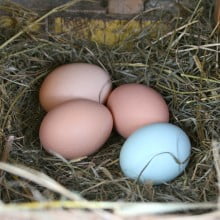Residents of Hockerton Housing Project are about two-thirds self-sufficient in vegetables, fruit and eggs. We also keep bees in our orchard, for honey and vital pollination, and our small flock of sheep are raised for meat and to help manage the land.
We supplement this with largely local in-season food to further minimise food miles, and collective purchasing from another co-operative – Suma.
What is sustainable food?
Sustainable development balances our economic, environmental and social needs, so here at Hockerton sustainable food means:
- Economic: growing our own food saves us money and travel costs, and growing food as a group saves us money on tools.
- Environmental: we use organic methods, so not only do we reduce the pollution caused by transporting food, we cause no pollution from the use of fertilisers, herbicides and pesticides.
- Social: we don’t eat together, but we do share the work of growing food and looking after the sheep, bees and chickens. This teamwork is sociable, and helps us learn new skills.



